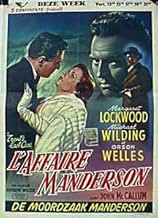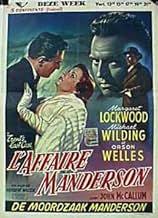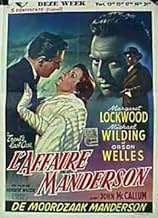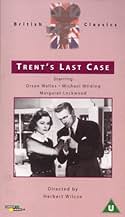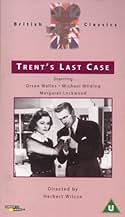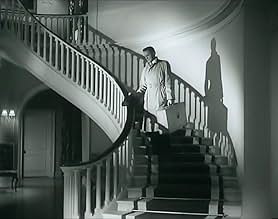AVALIAÇÃO DA IMDb
6,0/10
642
SUA AVALIAÇÃO
Adicionar um enredo no seu idiomaA reporter investigates a rich businessman's death. While police rule it suicide, Trent believes it's murder and grows intrigued by the widow and secretary.A reporter investigates a rich businessman's death. While police rule it suicide, Trent believes it's murder and grows intrigued by the widow and secretary.A reporter investigates a rich businessman's death. While police rule it suicide, Trent believes it's murder and grows intrigued by the widow and secretary.
- Direção
- Roteiristas
- Artistas
Geoffrey Bayldon
- Reporter in Court
- (não creditado)
Ernest Blyth
- Concert Attendee
- (não creditado)
Robert Cawdron
- Police Constable
- (não creditado)
John Chandos
- Tim O'Reilly
- (não creditado)
Anthony Collins
- Conductor
- (não creditado)
Henry Edwards
- Coroner
- (não creditado)
Eileen Joyce
- Pianist
- (não creditado)
Ben Williams
- Jimmy - Reporter
- (não creditado)
Kenneth Williams
- Horace Evans
- (não creditado)
- Direção
- Roteiristas
- Elenco e equipe completos
- Produção, bilheteria e muito mais no IMDbPro
Avaliações em destaque
MICHAEL WILDING is an armchair detective who sets out to determine whether or not the death of ORSON WELLES was suicide or murder. He thinks he's solved the case, only to learn that all is not what it appears (without giving the outcome away).
Unfortunately, the script is a dreary, talky and ponderous, making the film appear to be an amateurish stage play, although based on a novel. It's static. Nothing at all cinematic about the approach, nor is there any imagination in the directing.
Of all the players, MARGARET LOCKWOOD as the beautiful wife of the deceased man and JOHN McCALLUM as the man's secretary have key roles that they play with assurance. ORSON WELLES, with fake nose and bushy brows, might as well have been from another film. His ten or fifteen minutes of time on screen renders nothing but ham. Director Herbert Wilcox was evidently unable to tone him down and as a result his key scenes throw the film off stride. MICHAEL WILDING has a colorless role as the newspaper reporter who suspects foul play but can't prove anything.
With a talky script and lack of any cinematic touches, TRENT'S LAST CASE goes nowhere fast and leaves the viewer expecting a strong twist that never arrives--instead, a flat ending.
Production values are fine even though the film comes from the usually low-budget Republic studios.
Unfortunately, the script is a dreary, talky and ponderous, making the film appear to be an amateurish stage play, although based on a novel. It's static. Nothing at all cinematic about the approach, nor is there any imagination in the directing.
Of all the players, MARGARET LOCKWOOD as the beautiful wife of the deceased man and JOHN McCALLUM as the man's secretary have key roles that they play with assurance. ORSON WELLES, with fake nose and bushy brows, might as well have been from another film. His ten or fifteen minutes of time on screen renders nothing but ham. Director Herbert Wilcox was evidently unable to tone him down and as a result his key scenes throw the film off stride. MICHAEL WILDING has a colorless role as the newspaper reporter who suspects foul play but can't prove anything.
With a talky script and lack of any cinematic touches, TRENT'S LAST CASE goes nowhere fast and leaves the viewer expecting a strong twist that never arrives--instead, a flat ending.
Production values are fine even though the film comes from the usually low-budget Republic studios.
This viewer is not exactly a devotee of the films of Herbert Wilcox but this one is not at all bad. E. C. Bentley had intended his novel to be a parody and although Wilcox has chosen to play it straight one cannot actually take it too seriously. This director's notable lack of flamboyance happens to suit this rather innocuous, teddibly civilised period piece very well.
It is presented by Republic Pictures for whom Orson Welles had made his bizarre 'Macbeth.' One is intrigued by his third billing and eagerly awaits his appearance. It is certainly worth the wait as his Mephistophelian presence and basso profundo are absolutely magnetic. It seems as if we are suddenly in an entirely different film and one is hardly surprised to learn that Welles wrote and directed his own scenes!
As for the rest of the film we have the debonair Michael Wilding, certainly no stranger to Wilcox, who is well cast as Bentley's engaging amateur sleuth of the title. Playing the widow of the millionaire who is assumed to have committed suicide, although Trent suspects foul play, is Margaret Lockwood. It is far more difficult to play 'good' than 'bad' and Miss Lockwood is more effective when playing the latter. The same comment would also apply to John McCallum as the prime suspect. The delightful Miles Malleson is, well.....Miles Malleson!
There is splendid use made of the Larghetto from Mozart's C minor piano concerto which suits the melancholy mood of the film.
By far the best scene(surprise, surprise) is one directed and wonderfully lit by Welles in which he and John McCallum discuss Shakespeare's depiction of a husband's jealousy in 'Othello'. Welles remarks that he had recently seen this play performed at St. James's Theatre and was none too keen on the leading actor. He is of course referring to, yes, you've guessed it........ himself!
It is presented by Republic Pictures for whom Orson Welles had made his bizarre 'Macbeth.' One is intrigued by his third billing and eagerly awaits his appearance. It is certainly worth the wait as his Mephistophelian presence and basso profundo are absolutely magnetic. It seems as if we are suddenly in an entirely different film and one is hardly surprised to learn that Welles wrote and directed his own scenes!
As for the rest of the film we have the debonair Michael Wilding, certainly no stranger to Wilcox, who is well cast as Bentley's engaging amateur sleuth of the title. Playing the widow of the millionaire who is assumed to have committed suicide, although Trent suspects foul play, is Margaret Lockwood. It is far more difficult to play 'good' than 'bad' and Miss Lockwood is more effective when playing the latter. The same comment would also apply to John McCallum as the prime suspect. The delightful Miles Malleson is, well.....Miles Malleson!
There is splendid use made of the Larghetto from Mozart's C minor piano concerto which suits the melancholy mood of the film.
By far the best scene(surprise, surprise) is one directed and wonderfully lit by Welles in which he and John McCallum discuss Shakespeare's depiction of a husband's jealousy in 'Othello'. Welles remarks that he had recently seen this play performed at St. James's Theatre and was none too keen on the leading actor. He is of course referring to, yes, you've guessed it........ himself!
It's good news for Welles completists that this, the better of the two films he made for Herbert Wilcox in 1952 (to help finance his on-off-on but finally magnificent film of 'Othello') is now available on DVD, though dismally free of extras. As a thriller it is a puzzle almost devoid of suspense, though there are some clever twists at the end. There are polished performances by Margaret Lockwood, John McCallum, Michael Wilding as the classy sleuth Trent, Miles Malleson in one of his best roles and Welles. Welles appears for no more than 20 minutes, in flashback, but, with his formidable false nose, is an intimidating presence as the late Sigsbee Manderson. In a fraught dialogue with McCallum he talks about 'Othello' and the production he's recently seen: "Didn't like the leading actor!" The leading actor was Welles himself, performing at the St James' theatre - a performance I was privileged have seen a year or two earlier, when Ken Tynan, long before PC was thought of, headed his review 'Citizen Coon'!
Agatha Christie considered this intrigue one of the best ever written, and it certainly is. The mystery is deep here, and as it gradually is unravelled you are in for any number of surprises. The actors are outstanding, with Michael Wilding as the detective intruding on the private lives of the young widow Margaret Lockwood and the man who loves her, who is the prime suspect, while Orson Welles as the victim provides an impressing finale as he enters in the final flashback. Miles Malleson plays an important part as a reluctant participant in the plot, while the story is what really matters. Herbert Wilcox' direction is faultless but very formal, giving the film a somewhat conventional character - there is no cinematography to speak of, while music plays an important part - Eileen Joyce has a moment as a performing pianist, and the film score is by Anthony Collins, who is also seen acting as a conductor - one of his rare appearances on film. After having reached the end of the story, and Michael Wilding closing his last case as Trent, yuo just have to agree with Agatha Christie about the marvellous windings of this plot.
This is pure whodunit,in the grand tradition of Agatha Christie and there are similarities with the lady of crime's "murder on the links" ,but the solution is not as brilliant as hers ,because in this field,she has no equal.
Anyway ,everyone who likes Christie will relish .A desirable mansion ,where a man took his own life (or was it murder?) and suspects including two secretaries,one of whom may be in love with the dead's wife and the other one may be jealous.But the main asset of the movie is the wealthy (suicidal?) businessman ,masterfully portrayed by Orson Welles whom we only see in flashbacks :the scene when we hear his formidable voice ,but only the back of his armchair gives the jitters. Michael Wilding has no gray cells,but he displays flair for clues ,as though he had be trained by Hercule Poirot.Entertaining whodunit.
Anyway ,everyone who likes Christie will relish .A desirable mansion ,where a man took his own life (or was it murder?) and suspects including two secretaries,one of whom may be in love with the dead's wife and the other one may be jealous.But the main asset of the movie is the wealthy (suicidal?) businessman ,masterfully portrayed by Orson Welles whom we only see in flashbacks :the scene when we hear his formidable voice ,but only the back of his armchair gives the jitters. Michael Wilding has no gray cells,but he displays flair for clues ,as though he had be trained by Hercule Poirot.Entertaining whodunit.
Você sabia?
- CuriosidadesIn the film, Sigsbee Manderson (played by Orson Welles) mentions a performance of Shakespeare's "Othello" at the St. James Theatre in London in 1951, in which he disliked the leading actor's performance. This is an in-joke: Welles himself played Othello at the St. James in 1951, under his own direction. Peter Finch played Iago opposite him.
- Erros de gravaçãoDuring the coroners inquest, Trent was seen drawing a sketch of Marlowe. This is not allowed in English Courts. Although court artists are allowed in as members of the public, all drawings must be done by memory outside the courtroom.
- Citações
Margaret Manderson: He talks of reopening the case.
John Marlowe: You should've ordered him out of the house.
Margaret Manderson: And confirm his suspicions?
- Trilhas sonorasPiano Concerto in C Minor
Music by Wolfgang Amadeus Mozart (as Mozart)
Arranged and Conducted by Anthony Collins (uncredited)
Performed by Eileen Joyce
Principais escolhas
Faça login para avaliar e ver a lista de recomendações personalizadas
Detalhes
- Tempo de duração
- 1 h 30 min(90 min)
- Cor
- Proporção
- 1.37 : 1
Contribua para esta página
Sugerir uma alteração ou adicionar conteúdo ausente

